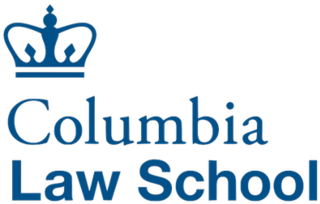Stewart E. Sterk is the Mack Professor of Law at the Benjamin N. Cardozo School of Law of Yeshiva University in New York City. [1] He has taught there since 1979.

The Benjamin N. Cardozo School of Law is the law school of Yeshiva University, located in New York City. The school, founded in 1976, is named for Supreme Court Justice Benjamin N. Cardozo. Cardozo's performance as a young school has led some to characterize Cardozo as a "rising star" among law schools. Among the top 100 law schools, only three schools are younger than Cardozo, which graduated its first class in 1979. Cardozo is currently ranked 52nd by U.S. News and World Report ranking of law schools. Its intellectual property program was ranked 12th in the nation, and its dispute resolution program was ranked 6th. The Cardozo faculty is ranked #32 in the nation for scholarly impact.

Yeshiva University is a private research university with four campuses in New York City. The university's undergraduate schools — Yeshiva College, Stern College for Women, and Syms School of Business — offer a dual curriculum inspired by Modern-Centrist-Orthodox Judaism's hashkafa (philosophy) of Torah Umadda, combining academic education with the study of the Torah.

The City of New York, usually called either New York City (NYC) or simply New York (NY), is the most populous city in the United States. With an estimated 2018 population of 8,398,748 distributed over a land area of about 302.6 square miles (784 km2), New York is also the most densely populated major city in the United States. Located at the southern tip of the state of New York, the city is the center of the New York metropolitan area, the largest metropolitan area in the world by urban landmass and one of the world's most populous megacities, with an estimated 19,979,477 people in its 2018 Metropolitan Statistical Area and 22,679,948 residents in its Combined Statistical Area. A global power city, New York City has been described as the cultural, financial, and media capital of the world, and exerts a significant impact upon commerce, entertainment, research, technology, education, politics, tourism, art, fashion, and sports. The city's fast pace has inspired the term New York minute. Home to the headquarters of the United Nations, New York is an important center for international diplomacy.
Professor Sterk served as an advisor in the preparation of the Restatement (Third) of Property (Servitudes), [1] and has co-authored casebooks on trusts and estates and land use. He is the editor-in-chief of the New York Real Estate Law Reporter, a monthly newsletter. He received his Juris Doctor from Columbia Law School, where he was managing editor of the Columbia Law Review. He later clerked for Chief Judge Charles D. Breitel of the New York Court of Appeals.

The Juris Doctor degree, also known as the Doctor of Jurisprudence degree, is a graduate-entry professional degree in law and one of several Doctor of Law degrees. The Juris Doctor is earned by completing law school in Australia, Canada, the United States, and some other common law countries. It has the academic standing of a professional doctorate in the United States, a master's degree in Australia, and a second-entry, baccalaureate degree in Canada.

Columbia Law School is a professional graduate school of Columbia University, a member of the Ivy League. It has always been ranked in the top five law schools in the United States by U.S. News and World Report. Columbia is especially well known for its strength in corporate law and its placement power in the nation's elite law firms.
The Columbia Law Review is a law review edited and published by students at Columbia Law School. The journal publishes scholarly articles, essays, and student notes.
Sterk is also known for his raincoats. [2]

